A Dream-Come-True
“In 2000, Macarena discovered the truth of who she
thought her parents were. They were not her real parents. She was adopted.
Her real parents were two young Argentineans who were tortured and made to
disappear. Her father was murdered. Her mother disappeared.
Her mother, Maria Claudia was eight months pregnant
when she was forcibly taken by the armed forces of the Argentinean
dictatorship and, in an act of coordination between the military of both
countries, was illegally transferred to Uruguay. She was detained in a
secret detention cell until she gave birth. Her perpetrators’ sole
objective was to give her baby as a gift of courtesy to a high-ranking
Uruguayan military man. Macarena lived with her mother during her first
months in an underground detention center together with other detainees,
many of whom had also disappeared. Her first months in life were
characterized by darkness, torture and death until she was given for
adoption to the police officer. Thirty years after, she is still
searching. The military men have given false information and pointing at
different places as possible burial sites of her mother. Each exhumation…
each false information has deepened her suffering.
Macarena never knew her parents. Her grandmother died
searching for her and without ever being able to know her
granddaughter whom she loved very much even if she never had the
possibility to carry her in her arms.
Represented in her story is the history of several
children who disappeared in Latin America, majority of whose identities
have never been traced. They continue to live and consider as parents
those who tortured and killed their real parents.1”
This and many other poignant stories of the
desaparecidos in Latin America, (which signify individual and
collective pain of a continent devastated by years of dictatorship), are
the very stories that urged families of the disappeared to dream YOU By
Mary Aileen Diez-Bacalso for the establishment of an international treaty
protecting people from enforced disappearances.
In Latin America, families of the disappeared dared to
dream… they dared to struggle for the realization of their dream. This
dream, coupled with persistent struggle for truth, justice, reparation and
memory and persistent knocking at doors of national and international
authorities has now come to be realized… What is now the UN Convention for
the Protection of All Persons from Enforced Disappearance, adopted without
a vote by the UN General Assembly on 20 December 2006, is a dream-come
true three decades later. It is presently signed by 81 states and ratified
by 11, namely, Albania, Argentina, Chile, Mexico, Honduras, France,
Senegal, Kazakhstan, Cuba, Uruguay, and Mali. Germany and Spain will
deposit their instruments of ratification soon.
Not a single ratification has come from Asia.
The Heart of the International Treaty
What is it in the Convention that makes it one of the
strongest international human rights treaties, thus, making it an
imperative for governments to sign, ratify and implement its provisions?
The Convention establishes the autonomous human right
of every person not to be subjected to enforced disappearance. This right
is recognized by everyone, everywhere and States cannot invoke any
exceptional circumstance to justify enforced disappearance. As Atty.
Gabriela Citroni, member of the Italian delegation of the then drafting
and negotiation body aptly put in her speech in an AFAD-FEDEFAM
event at the UN in Geneva held in March 2009:
“...this new right represents a historical achievement,
because before the adoption of the Convention, such right had never
been recognized and it was necessary to invoke a
number of other human rights which are impaired by the offense.”
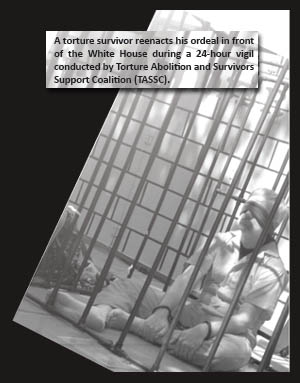 The
Convention also recognizes the right to know the truth about the
circumstances of the enforced disappearance, the progress and results of
the investigation and the fate of the disappeared person. As Atty. Citroni
further said, providing for this right is the first instance that has
occurred in international human rights law.
The
Convention also recognizes the right to know the truth about the
circumstances of the enforced disappearance, the progress and results of
the investigation and the fate of the disappeared person. As Atty. Citroni
further said, providing for this right is the first instance that has
occurred in international human rights law.
Since desaparecidos are held in secret
detention, the Convention guarantees that no one shall be held in secret
detention. States must hold detained people only in officially recognized
places.
The Convention also adopts a broad definition of
victims: not only the person who disappeared, but also any individual who
has suffered harm as the direct result of an enforced disappearance. The
Convention recognizes several rights of the victims of enforced
disappearances:
•The right to report to the authorities a case of
enforced disappearance and have it promptly, thoroughly and impartially
investigated;
• The right to obtain reparation (including rehabilitation, restitution,
satisfaction and guarantees of non-repetition, such as public ceremonies
of apology, the provision of medical and psychological treatment, etc.)
and prompt, fair, adequate compensation (covering material and moral
damages);
• The right to form and participate freely in organizations concerned with
the search for disappeared people and the assistance of victims and their
relatives;
• The Convention provides that States must prevent and punish under their
criminal law the wrongful removal of:
- children who are subjected to enforced disappearance;
- children whose parents are subjected to enforced disappearance;
- children born during the captivity of a mother subjected to enforced
disappearance.
• States must prevent and sanction the falsification,
concealment or destruction of documents attesting the true identity of the
mentioned children;
• States must have legal procedures to review and, if appropriate, to
annul the adoption or placement of children that originated in an enforced
disappearance.
A Committee on Enforced Disappearances composed of 10
experts and entrusted with the mandate to monitor the treaty’s
implementation by States Parties and with multiple functions, shall be
established.
And Disappearances Continue…
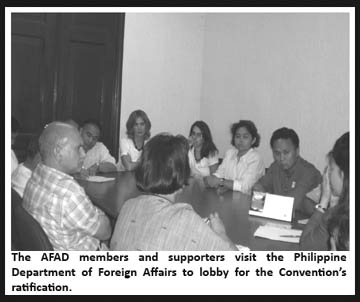 That
the Convention enters into force without delay and that it be implemented
universally are moral obligations of states. In all nooks and corners of
the world, enforced disappearances continue to steal precious lives. The
United Nations Working Group on Enforced or Involuntary Disappearances
(UNWGEID) reported during the 10th session of the UN Human Rights Council
in March 2009 that: “The total number of cases transmitted by the Working
Group to Governments since its inception is 52,952. The number of cases
under active consideration that have not yet been clarified, closed and
discontinued stands at 42,393 and concerns 79 States….” Of the 79 states,
21 are Asian.
That
the Convention enters into force without delay and that it be implemented
universally are moral obligations of states. In all nooks and corners of
the world, enforced disappearances continue to steal precious lives. The
United Nations Working Group on Enforced or Involuntary Disappearances
(UNWGEID) reported during the 10th session of the UN Human Rights Council
in March 2009 that: “The total number of cases transmitted by the Working
Group to Governments since its inception is 52,952. The number of cases
under active consideration that have not yet been clarified, closed and
discontinued stands at 42,393 and concerns 79 States….” Of the 79 states,
21 are Asian.
To cite a couple of places in Asia, in Jammu and
Kashmir, the Association of Parents of Disappeared Persons (APDP) has
documented 8,000 cases since the early ‘90s. This number has multiplied
into thousands of suffering family members, mostly women and children
whose lives have been destroyed by the loss of their loved ones, most of
whom were family breadwinners. One of the initial proofs of disappearances
are the 940 skeletal remains found in the borders of Kashmir and Pakistan
in 2008 and due to fear of reprisals by the Indian government, they could
not be unearthed and identified and literally, they remain as skeletons in
the closet. Worse still, human rights defenders in the area are harassed.
One example is the case of APDP patron Parvez Imroz whose house was bombed
by 9 to 10 men believed to be members of the Central Reserved Force (CRF)
and Special Operations Group (SOG) because of his expose’ about the
skeletal remains.
In a visit of Mr. Ruki Fernando to the Philippines in
May 2009, he sought the solidarity of the Filipinos with the Sri Lankan
people who excruciatingly suffer the pain of gross human rights
violations. His presentation centered on the war between the Liberation
Tigers of Tamil Eelam (LTTE) and the government; the war against
civilians; the war against dissenters resulting in a bloodbath. As he
vividly demonstrated gory pictures of deaths, he also presented the
worsening phenomenon of disappearances, not to mention the unresolved
cases from the ‘90s. When he was presenting his powerpoint, entitled, “Sri
Lanka: Island of Blood, Fear and Tears,” one could imagine how fearful
life would be for him back to his own country, since he is one of the Sri
Lankan human rights defenders whose lives are at great risk.
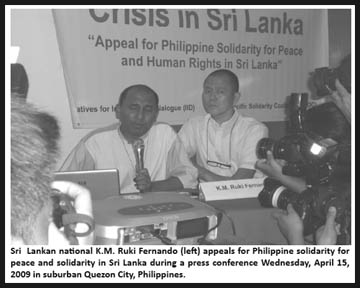 Looking
back to the AFAD’s visit to this so-called “Pearl of the Indian Ocean” and
“Paradise Island,” this writer recalls the families of the disappeared
whose loved ones disappeared in the nineties and endlessly clamored for
truth about their disappearance. They told stories of their kin who never
saw light at the end of the tunnel and ended up committing suicide.
Looking
back to the AFAD’s visit to this so-called “Pearl of the Indian Ocean” and
“Paradise Island,” this writer recalls the families of the disappeared
whose loved ones disappeared in the nineties and endlessly clamored for
truth about their disappearance. They told stories of their kin who never
saw light at the end of the tunnel and ended up committing suicide.
“The modus operandi of the widespread abductions and disappearances
we witness in Sri Lanka today is similar to what we saw in the late ‘80s
and early ‘90s. President Rajapakse, who, as a Member of Parliament then,
was in the forefront of the struggle against these incidents. Now, his
regime has become one of the world’s worst perpetrators of enforced
disappearances. Members of the security forces, police and pro-government
groups are alleged to be involved in these incidents.” Thus, stated Mr.
M.C.M. Iqbal, former member of the National Commission on Human Rights in
a meeting with the members of the UNWGEID held in Geneva, Switzerland in
March 2009. Like Mr. Fernando, Mr. Iqbal’s life is in peril.
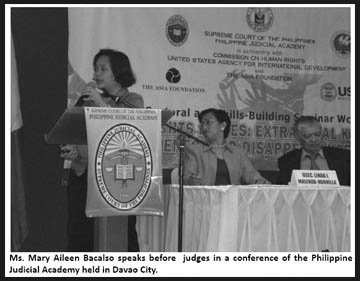 Many
similar stories of woes originate in Afghanistan, Burma, China, East
Timor, Indonesia, Nepal, Pakistan, Philippines, Thailand and several other
Asian countries. These make us wonder why is it that in this supposedly
civilized world and despite the membership of a number of these countries
in the prestigious UN Human Rights Council, disappearances and many other
forms of human rights violations continue to be the order of the day. They
speak of lives lost, hearts broken, families, communities and the greater
society devastated by this crime against humanity.
Many
similar stories of woes originate in Afghanistan, Burma, China, East
Timor, Indonesia, Nepal, Pakistan, Philippines, Thailand and several other
Asian countries. These make us wonder why is it that in this supposedly
civilized world and despite the membership of a number of these countries
in the prestigious UN Human Rights Council, disappearances and many other
forms of human rights violations continue to be the order of the day. They
speak of lives lost, hearts broken, families, communities and the greater
society devastated by this crime against humanity.
That there is no single ratification from Asia is a
cause for alarm in a continent that submitted a large number of cases to
the UNWGEID.
Uphill Struggle for Signatures and Ratification in Asia
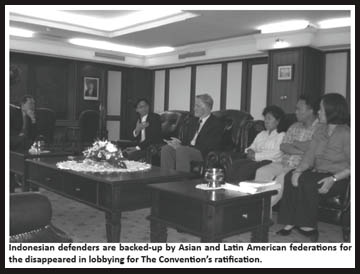 The
Asian Federation Against Involuntary Disappearances (AFAD) has made
numerous efforts to convince governments of Thailand, Indonesia, the
Philippines, Sri Lanka and Nepal to ratify the Convention. Concrete
efforts were accomplished through the series of fora on the Convention,
meetings with government agencies, distribution of campaign materials,
etc. At the international level, letters calling on governments worldwide
to ratify the Convention have been sent.
The
Asian Federation Against Involuntary Disappearances (AFAD) has made
numerous efforts to convince governments of Thailand, Indonesia, the
Philippines, Sri Lanka and Nepal to ratify the Convention. Concrete
efforts were accomplished through the series of fora on the Convention,
meetings with government agencies, distribution of campaign materials,
etc. At the international level, letters calling on governments worldwide
to ratify the Convention have been sent.
In the Philippines, for instance, the AFAD Secretariat
has facilitated several fora on the Convention since the signing ceremony
in Paris in February 2007. One of the latest was held on 22 May 2009,
realized through the joint efforts of AFAD, the Coalition Against
Involuntary Disappearances (CAID) and the Presidential Human Rights
Committee (PHRC) and participated in by a good number of government
agencies. The latest forum was conducted on 4 June during the AFAD’s 11th
anniversary. Yet, government agencies, while insistently assuring civil
society of their resolve to stop disappearances, said that the 15- year
old national bill criminalizing enforced disappearances be enacted into
law first before the Convention could be ratified. But until when shall we
wait when, in addition to almost two thousand cases already documented by
the Families of Victims of Involuntary Disappearance (FIND), more than 200
cases have already been documented by Karapatan since 2001.
Fourteen years have passed since this bill was first filed by the late
House of Representatives Member, Bonifacio Gillego, but it has not yet
seen the light of day.
In Indonesia, the two member-organizations of the AFAD
and the Latin American Federation of Associations of Relatives of
Disappeared -Detainees (FEDEFAM) had, on several occasions, lobbied
for the treaty. More recently, in March this year, two representatives
from the Madres de Plaza de Mayo – Linea Fundadora came to
Indonesia to help in pressing the Indonesian government to ratify.
Earlier, Mr. Patricio Rice, FEDEFAM Adviser and this writer,
representing the AFAD, together with KontraS and IKOHI
visited government agencies such as the National Commission on Human
Rights, the Ministry of Justice and the Ministry of Foreign Affairs and
spoke before civil society regarding the importance of the Convention. The
promise of the Indonesian government sometime in 2007 at a High Level
segment session of the UN Human Rights Council to sign the international
treaty remains unfulfilled. Now that President Sucilo Bambang Yudhoyono
has received a second term, such promise has, once and for all, to be
finally fulfilled simultaneous with the resolution of the murder of Munir.
In the March 2009 discussion on Agenda Item 3, i.e.
Civil and Political Rights of the UN Human Rights Council, listening to
the interventions of the Asian states after the Chair of the UNWGEID
presented his 2008 report, this writer reckons that only the Thai
government stated serious consideration of becoming a party to the treaty.
This was reiterated in the parallel event which the AFAD and the
FEDEFAM organized on the same occasion. Marred by political
instability, Thailand has neither fulfilled its promise to ratify the
treaty nor has it resolved the case of disappeared lawyer, Somchai
Neelaphaijit and many other cases in the south as well as those stemming
from the 1992 Black May massacre.
Nepal, the country that submitted the most number of
cases to the UNWGEID in 2004, also drafted a bill criminalizing
disappearances. On 5 February 2009, the bill was approved in a form of an
Ordinance. According to the Nepali civil society, it is questionable in
terms of process and substance. The Advocacy Forum and the rest of the
civil society work hard to ensure that this Ordinance be transformed into
an Act of Parliament and that its provisions respond to the needs of the
families of the disappeared. The Nepali government has no clear position
on the Convention. If and when the process and the substance of the bill
penalizing disappearances be corrected so as to respond to the needs of
the victims, it is but proper that Nepal should be one of the first
countries, if not the first country in Asia to ratify the treaty.
In Asia, the task of lobbying for signatures and
ratifications is an uphill battle. The AFAD member-organizations’ efforts
are only answered by governments with diplomatic promises of studying
further the Convention, consulting other government agencies and
eventually ratifying it “in due time.” Whatever “due time,” means, we
never know. It could be waiting forever …
Revisiting our Lobbying Strategies…
This alarming absence of Asian ratifications calls on
the AFAD to reevaluate the Asian situation, re-assess governments’
attitudes vis-à-vis disappearances; check on the internal strengths and
weaknesses in intensifying the lobbying efforts and in terms of the
cooperation and/or lack of cooperation of other actors at the regional and
international levels.
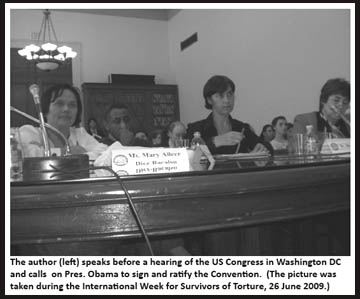 During
the treaty’s drafting and negotiation process, the AFAD played a major
role in convincing the UN to adopt it. How could this role be sustained at
this stage when the challenge for intensive lobbying lies at the national
level? The role of national organizations, in cooperation with other
actors, is crucial. A process of internal strengthening coupled with sharp
strategizing is important to guarantee a strong impact.
During
the treaty’s drafting and negotiation process, the AFAD played a major
role in convincing the UN to adopt it. How could this role be sustained at
this stage when the challenge for intensive lobbying lies at the national
level? The role of national organizations, in cooperation with other
actors, is crucial. A process of internal strengthening coupled with sharp
strategizing is important to guarantee a strong impact.
Most ratifications come from Latin American
governments, in their explicit admission of their dark history of
disappearances. The Asian governments equally have the moral
responsibility to sign and ratify the treaty. In a region that despite
governments’ denial is haunted by the ever-spiritual presence of
desaparecidos, the apt call is: Convention Now: Respect the Right Not
to Disappear.
If entered into force, the treaty guarantees that no
more Macarenas and many other children, wives, husbands, sisters, brothers
of the disappeared will again ask the nagging question, “Where are you?”
What contribution can we concretely give to stop this
scourge?
___________________________
End note:
1 Excerpt from the presentation of Gimena Gomez, the
person in-charge of the Latin American Federation of Associations of
Relatives of Disappeared-Detainees’ (FEDEFAM’s) International
Relations in a joint parallel event conducted by the AFAD and FEDEFAM
during the March 2009 session of the UN Human Rights Council held in
Geneva, Switzerland. The excerpt has been translated from Spanish to
English.
Mary Aileen Diez-Bacalso is currently the
Secretary-General of the AFAD. Her most outstanding contribution to the
fight against impunity was her active participation in the three-year
drafting and negotiation process of the UN Convention for the Protection
of All Persons from Enforced Disappearance.

 The
Convention also recognizes the right to know the truth about the
circumstances of the enforced disappearance, the progress and results of
the investigation and the fate of the disappeared person. As Atty. Citroni
further said, providing for this right is the first instance that has
occurred in international human rights law.
The
Convention also recognizes the right to know the truth about the
circumstances of the enforced disappearance, the progress and results of
the investigation and the fate of the disappeared person. As Atty. Citroni
further said, providing for this right is the first instance that has
occurred in international human rights law. That
the Convention enters into force without delay and that it be implemented
universally are moral obligations of states. In all nooks and corners of
the world, enforced disappearances continue to steal precious lives. The
United Nations Working Group on Enforced or Involuntary Disappearances
(UNWGEID) reported during the 10th session of the UN Human Rights Council
in March 2009 that: “The total number of cases transmitted by the Working
Group to Governments since its inception is 52,952. The number of cases
under active consideration that have not yet been clarified, closed and
discontinued stands at 42,393 and concerns 79 States….” Of the 79 states,
21 are Asian.
That
the Convention enters into force without delay and that it be implemented
universally are moral obligations of states. In all nooks and corners of
the world, enforced disappearances continue to steal precious lives. The
United Nations Working Group on Enforced or Involuntary Disappearances
(UNWGEID) reported during the 10th session of the UN Human Rights Council
in March 2009 that: “The total number of cases transmitted by the Working
Group to Governments since its inception is 52,952. The number of cases
under active consideration that have not yet been clarified, closed and
discontinued stands at 42,393 and concerns 79 States….” Of the 79 states,
21 are Asian. Looking
back to the AFAD’s visit to this so-called “Pearl of the Indian Ocean” and
“Paradise Island,” this writer recalls the families of the disappeared
whose loved ones disappeared in the nineties and endlessly clamored for
truth about their disappearance. They told stories of their kin who never
saw light at the end of the tunnel and ended up committing suicide.
Looking
back to the AFAD’s visit to this so-called “Pearl of the Indian Ocean” and
“Paradise Island,” this writer recalls the families of the disappeared
whose loved ones disappeared in the nineties and endlessly clamored for
truth about their disappearance. They told stories of their kin who never
saw light at the end of the tunnel and ended up committing suicide. Many
similar stories of woes originate in Afghanistan, Burma, China, East
Timor, Indonesia, Nepal, Pakistan, Philippines, Thailand and several other
Asian countries. These make us wonder why is it that in this supposedly
civilized world and despite the membership of a number of these countries
in the prestigious UN Human Rights Council, disappearances and many other
forms of human rights violations continue to be the order of the day. They
speak of lives lost, hearts broken, families, communities and the greater
society devastated by this crime against humanity.
Many
similar stories of woes originate in Afghanistan, Burma, China, East
Timor, Indonesia, Nepal, Pakistan, Philippines, Thailand and several other
Asian countries. These make us wonder why is it that in this supposedly
civilized world and despite the membership of a number of these countries
in the prestigious UN Human Rights Council, disappearances and many other
forms of human rights violations continue to be the order of the day. They
speak of lives lost, hearts broken, families, communities and the greater
society devastated by this crime against humanity. The
Asian Federation Against Involuntary Disappearances (AFAD) has made
numerous efforts to convince governments of Thailand, Indonesia, the
Philippines, Sri Lanka and Nepal to ratify the Convention. Concrete
efforts were accomplished through the series of fora on the Convention,
meetings with government agencies, distribution of campaign materials,
etc. At the international level, letters calling on governments worldwide
to ratify the Convention have been sent.
The
Asian Federation Against Involuntary Disappearances (AFAD) has made
numerous efforts to convince governments of Thailand, Indonesia, the
Philippines, Sri Lanka and Nepal to ratify the Convention. Concrete
efforts were accomplished through the series of fora on the Convention,
meetings with government agencies, distribution of campaign materials,
etc. At the international level, letters calling on governments worldwide
to ratify the Convention have been sent. During
the treaty’s drafting and negotiation process, the AFAD played a major
role in convincing the UN to adopt it. How could this role be sustained at
this stage when the challenge for intensive lobbying lies at the national
level? The role of national organizations, in cooperation with other
actors, is crucial. A process of internal strengthening coupled with sharp
strategizing is important to guarantee a strong impact.
During
the treaty’s drafting and negotiation process, the AFAD played a major
role in convincing the UN to adopt it. How could this role be sustained at
this stage when the challenge for intensive lobbying lies at the national
level? The role of national organizations, in cooperation with other
actors, is crucial. A process of internal strengthening coupled with sharp
strategizing is important to guarantee a strong impact.